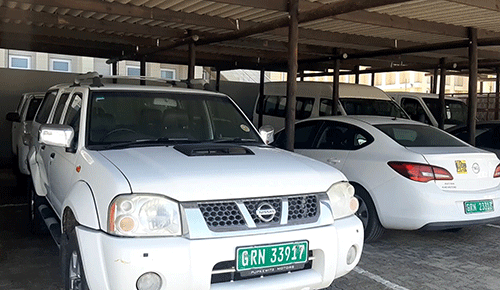Several government offices, ministries and agencies owe the works and transport ministry – government’s asset custodian – over N$1.5 billion in unpaid fees for leasing vehicles from the ministry over the past five years.
They are supposed to pay the ministry on a daily or monthly basis depending on respective agreements.
The current business practice is unsustainable to the ministry.
This is attributed to the cumbersome procurement process, a persisting backlog of vehicle repairs, dormant workshops [for 10 years], high accident rates and the outstanding payments.
Due to the economic squeeze, however, most of the agencies, ministries have been unable to pay the ministry.
“There is simply no money,” a source familiar with the matter said.
So dire is the situation that government has since placed filling vacant positions on ice to save money to honour the agreement it entered into with trade unions representing workers to affect wage increments.
The government agreed to a 3% basic salary increment across the board, housing allowance for civil servants below management by 11% and transport allowance by 14%. It will cost government N$924 million in the current financial
year.
Back in 2019, the transport ministry had a positive cash balance of around N$300 million in its vehicle lease’s trade account.
The money was later redirected to other pressing government needs in the face of dwindling finances.
Today, the works and transport ministry sits with a negative balance of N$1.5 billion on its trade balance.
There are about 3 300 government vehicles countrywide, ranging from sedans, VIP luxury vehicles, bakkies, kombis, trucks and buses for the 14 regions.
The trade account is run as a revolving fund, through which the ministry generates revenue for its operations, such as the procurement of new vehicles, maintenance, replacement, repair and disposal of vehicles.
On the positive side, the works ministry has been able to maintain a healthy balance in selling off State property.
The account held at a local bank has around N$300 million in it.
At present, the funds are being used to renovate government flats and houses.
Pre-paid water and electricity meters are being installed in government properties with a view to lessen the burden on the State.
Currently, the government is responsible for footing the water and electricity bills of those freely occupying State-owned houses.
Days are numbered in that regard.
“People staying in government flats will soon start paying for their own water and electricity. It is the only way to control unnecessary expenditure,” said another source who preferred anonymity.
At present, the government spends around N$500 million on rent yearly.
The government sold 34 houses for less than N$3 million across the country last year, an audit report shows. On average, it means each house went for a little over N$100 000. Compiled by Auditor General Junias Kandjeke, the report into the books of the works department, within the works and transport ministry, covers the 2020/2021 financial year.
It shows that 34 houses were sold under the scheme for N$3.8 million. The amount comprises a N$2.3 million selling price, N$160 877.11 for rates and taxes, arrears on rental amounting to N$93 137.11 and interest of N$215 301.32.
Cap
The revelations come at a time when the government has put a limit to what used to be an unlimited fuel card for political office bearers.
These include the ministers, deputy ministers, planning commission director general, speaker of the National Assembly and deputy speaker, the 14 regional governors and regional chairpersons as well as the leader of the official opposition.
Fuel is now capped at 640 litres [N$13 000] for off-road vehicles and 420 [N$8 400] litres for sedans a month. Some officials have complained about the cap, saying it is “too little”.
Officials at the works ministry are constantly harassed by politicians “who want to be taken care of by the government”.
If the monthly fuel for a given minister is depleted, they are expected to write to their appointing authority [President Hage Geingob] about why they should be given more fuel.
Due to the fact that most cannot justify, “they simply leave the petrol cards at service stations and collect them during the next monthly cycle.”
A moratorium on the procurement of government cars has been in place since 2020.
It will lapse in 2025.
Caption: (Fleet) Debt… Government owes the works ministry N$1.5 billion in unpaid fees for leasing vehicles.
Photo: Contributed


